#cybercrosis
Text
More Than Meets the Eye: Volume 5, Issues 17-22 - the Cyclonus and Tailgate edition.
This is the volume where Tailgate learns he is dying from cybercrosis and he is living on borrowed time. And I have read the AO3 stories from Tailgate's point of view where it seems like Cyclonus is pretending not to care or possibly doesn't care for real. I would like to share the string of events from Cyclonus's point of view - in other words, he actually cared so damn much.
When Tailgate first tells Cyclonus and Cyclonus leaves their shared hab suite:

(I don't know enough about Cyclonus/his culture to explain why he clawed his own face as a response to his grief.)
(More under cut)


(The only way Rodimus was going to get Cyclonus on the Seething Moon, a structure seething with sparks and that had been lost for who knew how long, was by letting Tailgate come along with them.)
Later, when Cyclonus is fighting one on one against Star Saber after Star Saber killed Dai Atlas:

"He lets the best of us get sick and die while degenerates like you go on forever." Tell me he isn't thinking about Tailgate right here. Tell me he isn't fighting for Tailgate.
After the baddies are beat, they find a cure, and they are back on the Lost Light, we get this:

Cyclonus was singing for him until he passed out.

Tailgate being in so much pain that he asks Cyclonus to kill him hurts me.
But not as much as the next page hurt me:

They show you THIS page before they explain WHY Cyclonus did this. And that hurt so bad because I thought, 'Oh, Cyclonus has lost all hope and is going to kill Tailgate after all.'
Then you keep reading and:

WHIRL SAVED TAILGATE'S LIFE. WHIRL SAVED TAILGATE'S LIFE.
(Also, Cyclonus is wearing the horn Tailgate made for him finally).
(He also saved Cyclonus's life earlier, which was quite funny:)

(It was not Whirl that stabbed Cyclonus, just to clarify.)
Y'all wouldn't have Cygate if it wasn't for my main bastard child.
#macaddam#tf comics#transformers#transformers g1#mtmte#Cygate#whirl#cyclonus#tailgate#idw transformers#Cybercrosis#More than meets the eye
80 notes
·
View notes
Note
Since Transformers're living beings, they obviously get sick, and diseases definitely exist. That's why there're medics. However, how do they get vaccinated, and do they even need to?
Dear Contagion Concerned,
In the same way that your own immune systems seek out and eliminate pathogens before they can infect your body, so too are our own internal workings protected by intricate, interconnected mechanisms that you might call an “immune system”. Our brain modules are heavily encrypted and secured behind what you would call a “firewall”, while our physical bodies are protected by a complicated system of ultra-thin, electrostatically charged plates that attract and filter out environmental hazards like sand, dust, and rust flakes.
However, these systems are not perfect, and in an ever-changing world Cybertronians must constantly update their software—and, in extreme cases, the hardware itself. When Cybertronians arrive on new worlds, their internal systems analyze the atmospheric conditions and geology of the local terrain and adapt their system accordingly. However, these kinds of ad-hoc reconfigurations are not enough to withstand the very worst diseases known to our species, and in these cases more drastic measures must be taken. In times of postwar prosperity, these campaigns take the form of “Quantum Cycle Upgrades”, where both Maximals and Predacons receive mandatory hardware and software packages that would bring them up to a consistent standard. By the time of the Spark War, the Maximal Imperium and the Predacon Alliance had, over the course of multiple upgrade cycles, worked together to stamp out 73% of all Transformer diseases, including Cosmic Rust, cybercrosis, and Corrodia Gravis.
However, in times of war, where the Cybertronian race is scattered across the galaxy and the worst of our kind concoct monstrous bioweapons, this kind of "herd immunity" is impossible, as is any kind of organized, species-wide response to a disease outbreak. Depending on the resources at hand, individual Cybertronians might have to adopt entirely new bodies in order to fight off an infection-as was the case when the Earth Defense Command transferred the minds of many Autobots and Decepticons into custom-built Binaltech bodies in order to stave off a debilitating Cosmic Rust infection, or when the Oracle reformatted Optimus Primal's Maximals into technorganic frames immune to Megatron’s transformation virus.
#ask vector prime#transformers#maccadam#japanese generation 1#beast wars#spark war#cosmic rust#cybercrosis#corrodia gravis#earth defense command#binaltech#oracle#optimus primal#megatron
45 notes
·
View notes
Text
predaking/ratchet hc -
tfp ratchet is truly the type of person that wouldn't expect anyone to love him because he is old, he doesn't think that he's attractive or desirable. he's never been the one who has been sought after or cherished. he's done so much for others, but he's either been a third wheel or just sidelined.
so when predaking starts to show genuine interest in him, after Ratchet leaves Cybertronian society to be a doctor for the new predacons, he just genuinely does not know how to react. Because who would love him? the old grumpy, annoying medic? he isn't strong, he isn't attractive, he's just Ratchet.
so he just ignores predaking, and goes back to working with the new protoforms and predacon sparklings. that is until predaking's advances become more clear.
"do you want to go out and eat" "i'm sorry for beating you to a pulp that one time" "do you need help walking back to your quarters?" it takes ratchet a very very long time to realize that someone actually loves him, and that to predaking - a literal king (because in my tfp aus he establishes his own territory/system completely divorced from cybertron and there are thousands of other predacons who become part of his kingdom), ratchet is the only thing that matters.
after some time, he accepts his advances
#i was working on a fic where starscream & ratchet leave cybertron together after ratchet is diagonsed with cybercrosis#it is purely platonic between them but ratchet is starscreams doctor and has helped him so star wants to give him one last wild ride#and they find the predacons#long story short ratchet works with the predacons - and falls for predaking#predacon RNA also completely reverses the affects of cybercrosis who woulda thunk#ratchet tfp#predaking tfp
15 notes
·
View notes
Note
I think it is simple to have a way for Cybertronians to die of old age: the spark is not a scource of infinite power and gives out eventually.
Iicr this is kinda? canon in IDW? I personally also like to think that at some point the frame can't be updated anymore, like how you can only replace so many parts on a car before it craps out on you. Plus if you're working in a continuity where beheading = death, you can include processor stuff in there too as any damage or inevitable failures in the circuitry there have to be hell to repair.
Death via old age is caused by a million little things going wrong enough they can't be righted, and just like with humans cybertronians aren't immune to this.
#maccadam#transformers#wait in bayverse doesn't jetfire literally die if old age in front of us#or was it something else#yeah wasn't tailgate almost dying of cybercrosis a whole thing because of how old he was?#this just made me remember how lobsters are 'technically' are immortal but there will be a day where they just can't finish the molting#it's too damn close to my birthday to be thinking about death lol
7 notes
·
View notes
Text
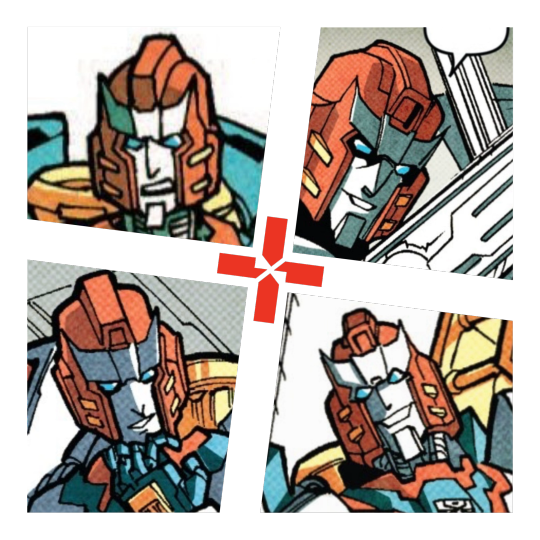
Medic, Maverick, Maniac, Murderer: Understanding Pharma
First thing’s first: I love Pharma, dearly.
In all the time I’ve spent evaluating his character, I’ve mainly focused on what can be worked out about who he is as an individual: his core sense of self, psychological drives, subjective worldview, etc.
When all else is stripped away, who is Pharma?
This treatise is the product of obsessing over Pharma, analyzing canon (and extras), and reading as many different perspectives on his character from fans across the fandom. The post is long, so for those of you who balk at the thought of reading a shortfic’s worth of Pharma thoughts, feel free to read the TL;DR (Conclusion) at the end and then decide if the full read is worth your time. Also, a premium reading experience is available in the form of the original Google Doc version.
As you read, keep in mind that this is primarily a mix of psychoanalysis, evidence-based examination, and speculation—not moral, ethical, or sociological commentary. The goal is to examine Pharma’s psychological drives and core values, and each of his appearances in the context of those. All other types of evaluation are up to readers.
Now, take your victim blaming-allergy meds (just in case); remove your black-and-white thinking caps; and leave your personal morality lenses at the door.
Psychological Drives & Core Values
Why does Pharma act the way he does? What gives him a reason to keep living? What are his personal priorities?
At the beginning of the Delphi arc, First Aid establishes Pharma as a “control freak” and someone who “thinks he’s an expert on everything.”

Now, First Aid has a habit of complaining about his bosses, but on both points, there’s canon evidence to back them both.
Expertise and Intellect
Throughout the Delphi and Luna 1 arcs, it’s established that Pharma is a skilled and brilliant doctor.
He once performed a 4-way fuel pump transplant, donating his own fuel pump in the process. (see above panel)
Later, he invented a soundbomb that left an echo laced with a virus and invented an antidote to that virus:
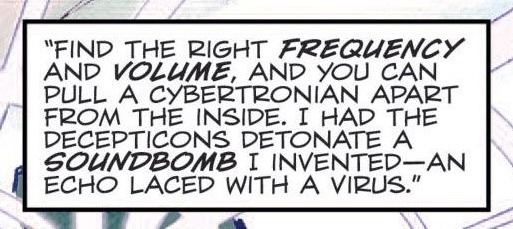
And on Luna 1, he was on the edge of finding a cure for Cybercrosis, based on the fact that Swerve was able to formulate a cure from his notes.
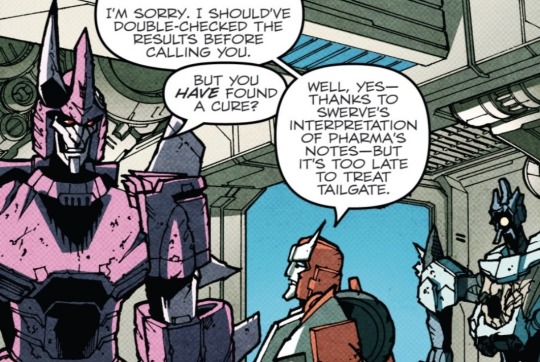
More than being a doctor, Pharma lives for intellectual and scientific achievement as a physician scientist. He feels most alive when he’s able to solve complex medical problems, and when his achievements are recognized by those whose opinion he considers important.
This is Pharma’s 'why.'
And even though he’s arrogant and enjoys praise, it’s not his primary motivation. He doesn’t need it in order to set his mind to whatever he’s interested in, although he’ll seek it from those he values most (i.e. Ratchet).
Pharma sees himself as less of a doctor, and more as a scientific innovator or medical maverick. The practice of medicine is primarily a catalyst for his creativity and intellect; it’s not an end in and of itself like it is for someone like Ratchet or First Aid.
First Aid’s observation of Pharma can be better phrased as, “[Pharma] thinks he’s an expert on everything medical”—because he’s not so driven by achievement and admiration that he’ll grovel at the feet of strangers and get good at something he doesn’t personally find interesting. The only time we see him express a desire for praise is when he’s around Ratchet—someone he holds in high regard for both personal and professional reasons. This makes sense since Ratchet is one of the only people who can give Pharma any kind of competition within what he considers to be his area of expertise.
“Each day we go to our work in the hope of discovering—in the hope that some one, no matter who, may find a solution of one of the pending great problems—and each succeeding day we return to our task with renewed ardor; and even if we are unsuccessful, our work has not been in vain, for in these strivings, in these efforts, we have found hours of untold pleasure, and we have directed our energies to the benefit of mankind.” —Nikola Tesla
Ego
Without question, Pharma has an inflated ego, but having an inflated sense of self doesn’t automatically mean a person is a full-blown narcissist or that they are totally uncaring.
Every personality trait exists on a spectrum. Yes, Pharma is arrogant, but the presence of arrogance doesn’t automatically and completely cancel out all “positive” traits. (For fun, check out studies on Dark Tetrad and Light Triad personality traits.)
People are complex. Arrogance can coexist with genuine kindness, ruthlessness can coexist with deep compassion, etc.
Whether Pharma exhibits genuine kindness is up to each reader’s interpretation of what little canon material exists, but the point is: Pharma’s arrogance doesn’t automatically rule out the possibility of authentic “positive” traits.
Controlling Tendencies
Pharma is comfortable pulling the power card and using it to dump what he sees as uninteresting parts of medical practice on those below him:
“So Fisitron’s writing about the Wreckers’ elbows now, is he?” said Delphi’s Chief Medical Officer. “Come on, First Aid - get to it. You’ve got a Fader in Row 2 downstairs.” He squeezed the air with his finger and thumb. “He’s about this far from shutdown.” —from Bullets by James Roberts
However, there’s nothing in canon indicating he’s power-hungry in a megalomaniacal sense. He’s not Starscream or Megatron; he doesn’t seek political or social power. In fact, he seems perfectly happy hiding away in a lab or medibay by himself so he can direct all his energy to solving issues and achieving the so-called ‘impossible’ within the field of medicine:
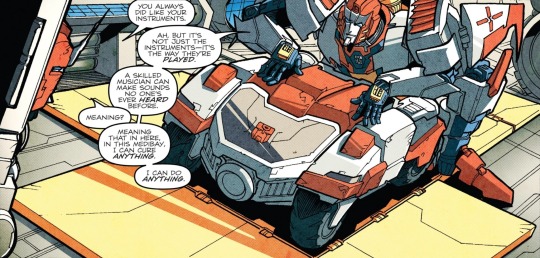
The ways in which Pharma exercises power and control are through his expertise, and his administrative/management skills. That’s it.
Self-confidence
Pharma’s arrogance and controlling tendencies don’t seem to be a mask—like he’s trying to compensate for some sense of lack (in those areas). Yes, he fears failure, and yes, he displays some insecurity when Ratchet questions his competence. But at every other point and in every other way, Pharma is unapologetically self-confident. He’s fully self-assured of his intellectual prowess and problem-solving capabilities; he knows what he knows, and he also knows what he doesn’t know.
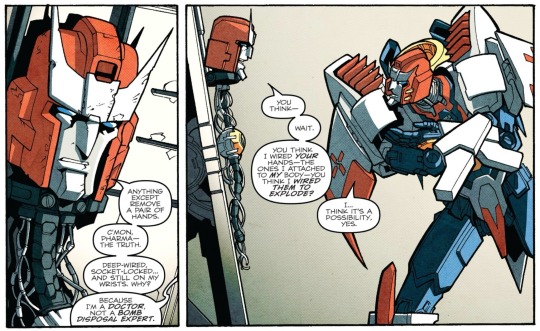
Pharma’s arrogance and desire for control don’t stem from a hidden lack of confidence or a hunger for power on its own. They stem from the fact that he genuinely sees himself as the best person for the work he does. He trusts himself above anyone else to solve problems that come his way—medical or otherwise (within limits).
Elitism vs. Superiority
I’ve always read Pharma as having an elitist attitude, but not in the social stratification sense:
elitist (adj.) relating to or supporting the view that a society or system should be led by an elite.
There’s no evidence that Pharma believes an elite class of people should hold the most power. Instead, Pharma’s “elitism” is actually an individualistic sense of superiority. It’s centered on him alone, and is tied to his capabilities as a physician scientist and surgeon.
Pharma sees himself as the best of the best and makes sure everyone knows it—sometimes through his words, but mostly by his conduct in the field of medicine. This, paired with Pharma’s natural temperament, doesn’t exactly make him socially popular—inside or outside of medicine:
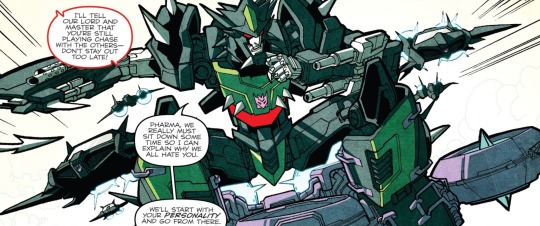
One could argue that the “personality” Lockdown is referring to was a result of all Pharma had suffered at Delphi and Luna 1, but just as easily, one could argue he was always a bit difficult to get along with, and that his traumatic experiences merely magnified his already-present psychological patterns. Personally, I like the latter interpretation because it’s a flaw that makes Pharma a more interesting character no matter his mental state.
Everyone reacts differently to real and perceived social rejection. Some are so concerned about it that they’ll try anything to belong; others genuinely don’t care, and they continue as usual; and still others cope by shifting their mindset and developing a sense of pride in being an outsider.
There’s no evidence for this in canon, but I believe it’s within reasonable characterization boundaries to headcanon Pharma as being in the second or third category.
With either of those two mindsets, a sense of superiority can develop, or even be an inciting factor. Either someone sees themselves as genuinely superior to the majority and doesn’t mind when this alienates them from people, or they convince themselves they’re superior because the pain of accepting they were rejected for who they are is too much to handle.
Whatever the case, the point is, having an “elitist” attitude isn’t necessarily rooted in a sociological or ideological belief. Sometimes, individuals just see something in themselves that—to them—justifies a sense of personal superiority. A quick glance at Pharma’s canon appearances makes it clear he holds such a view of himself, at least to some degree.
Morality and Compassion
When Pharma first shows up in canon, he’s working at the New Institute. A lot of questionable things took place there on a regular basis—things Pharma would have been aware of, to some degree. However, his presence at the Institute doesn’t automatically mean he agreed with everything happening. Depending on how strongly someone feels about something, some people are content to disagree in silence. Not everyone who seeks employment considers it a priority that the establishment they work for aligns perfectly with their moral values. After all, there are other reasons to take a job: financial benefits, exclusive educational and career opportunities, pure convenience, etc.
I’m not here to say either way whether Pharma’s willingness to turn a blind eye to the events at the New Institute was wrong or right; that’s up to each reader to decide for themselves. However, Pharma’s choice to remain employed at the Institute for some time can say something about him as a character: his priority as a doctor and person is not to take care of everyone he encounters, or to act as some kind of moral or ethical authority.
This isn’t to say Pharma won’t ever stand up for something he regards as right or push back against something he sees as wrong, “off screen.” It’s just that everything in canon points more to a tendency to choose his battles instead of acting immediately on any moral sense the way someone like Optimus or Ratchet might.
This also isn’t to say Pharma doesn’t care about saving lives, but from what little is shown of him before Delphi, it’s hard to say how much he cared. Ratchet confirms later that Pharma was an excellent doctor for most of his life, but all that tells us is he was an excellent doctor; it says nothing about his internal attitude toward his work or patients.
However, inferences can be made based on doctors in our own world:
Being a doctor—especially one in trauma care—is far from easy. It takes a lot out of a person, and there are very few people who last in the profession for a long time. Most medical professionals fall into one of the following categories:
People possessing a strong will that’s coupled with an unwavering passion for taking care of others (the public’s favorite)
People who naturally have, or develop, an ability to switch their empathy off and on at will, or build walls around it—also possessing a strong will (the ideal)
People who naturally have a limited capacity for empathy (the one the public hates to acknowledge)
People with a strong social and professional support system (the necessary, but underutilized and underappreciated factor)
Of course, even if a person has one or more of the above, burnout can and does still happen, but individuals who have at least one have the best chances of surviving and thriving amidst the demands of the majority of medical professions.
As far as is shown in canon, Pharma never had a strong support system—either circumstantially or by choice—so something else was keeping him in medicine.
Pharma shows concern for both Tumbler (Chromedome) and Hubcap:
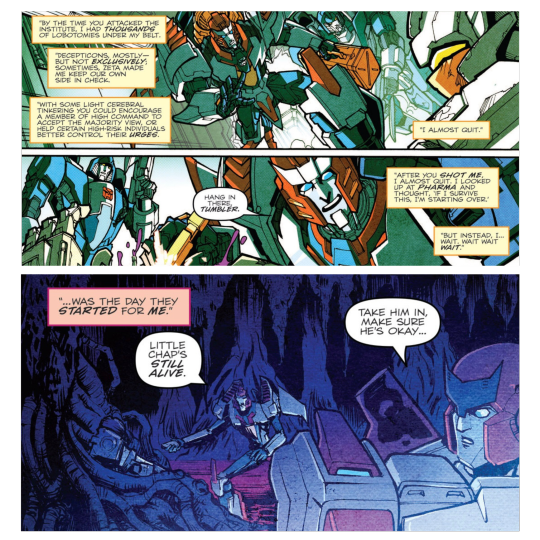
But even though he obviously cared enough to step in, neither instance makes a strong case for a capacity for empathy beyond the “average” or “norm.” Performing a job well is a lot different from being personally invested in the work.
Based on everything up to this point, and this later comment from Pharma, about Ratchet…
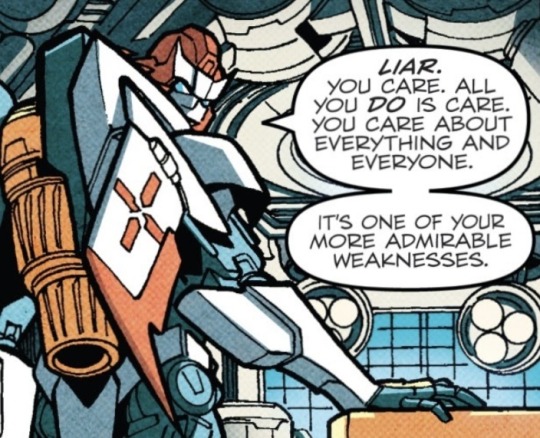
…Pharma has probably never shared the same I-care-about-everything-and-everyone view of the world. Instead, it’s more likely that Pharma holds a more rational view of his work and patients.
One of the first things learned in medicine, especially in trauma medicine, is that you can’t help or save everyone, and to hold yourself to that standard can destroy you quickly if you have a certain temperament or lack healthy boundaries for your empathy.
“There are times when it may seem as though I view sick or injured people not as living, breathing humans with feelings and emotions and people who love them, but simply as cases, as problems to be solved. And that is absolutely true. It's not that I don't have empathy, but the hard fact is that as a doctor, and especially as a trauma surgeon, too much empathy can get in the way of your job and cause you to make decisions based not on sound medical judgment but on your own emotions. Sure, I've seen things that even years later can still make me choke up when I think of them: a little girl shot and killed, a shattered young Marine who shouldn't have died but did. But you can't choke up in the ER or the operating room. To be effective as a trauma surgeon, you have to put a layer of Kevlar around your heart.” —Dr. Peter Rhee, Trauma Red: The Making of a Surgeon in War and in America’s Cities*
Pharma may have learned this difficult truth earlier than Ratchet and developed a practical way of managing his empathy that comes across as “cold.” He may have always had an ability to put up walls around his spark. Or, he may have always had little to no capacity for empathy.
The fact that the morality lock on Tyrest’s portal prevented Pharma from passing through proves he felt guilty for what he’d done, and JRO confirmed this. Therefore, it’s safe to assume Pharma had some level of empathy for his former patients, suffering moral injury when he felt he had no other option but to start killing them.
Still, looking at Pharma’s psychological drives and his behavior throughout canon, it’s clear compassionate care and morality are subordinate to his other values and interests.
*I highly recommend this book, and learning about Dr. Rhee in general. He’s a huge inspiration of mine, and one of my main sources of inspiration when writing Pharma. Level-headed and capable, strong-willed, selectively empathetic, an excellent scientist, etc. He lives for the thrill of practicing medicine both on the floor and as an expert in his field who pushes trauma medicine to new heights through his research. He also takes great pride in his hands. Seriously—the man spent an entire paragraph and a half talking about his “good hands” and how they were one of two reasons he decided to go into trauma surgery. The other reason was that he “liked action and excitement, liked the feeling of being able to walk into a tough situation and take control.” (Sounds familiar…)
Delphi
First thing’s first: we don’t know how much Pharma did or didn’t know about the DJD before agreeing to take the Delphi assignment.
That far into the war, he would have known something about the DJD and their ways of terrorizing traitors and Autobots, but for whatever reason, he took the assignment anyway. Perhaps Prowl assured him the situation on Messatine would be monitored and that the security team would be enough. Perhaps he underestimated the DJD’s capabilities, or scale of territory, and thought he would be able to handle things on his own. Perhaps Prowl gave him no choice. Maybe it was all of these and more.
Whatever the case, according to JRO, Pharma didn’t hate Delphi before the incident with the DJD.
Word of god remains a touchy subject in fandom, but in this case, it’s important because it says two things:
The DJD left the Delphi medical team alone for some time.
Being on the edges of DJD territory didn’t automatically mean isolation and harassment by their hand.
On the second point, First Aid was free to come and go from Messatine as he pleased, seeing as he attended a medical conference at Kimia five years into his assignment at Delphi:
Five years ago [mid-Delphi assignment], the leader of the Wreckers had cornered him at a medical conference at Kimia, the space station that doubled as a weapons research facility. —from Bullets
And five years after that, he was able to not only contact Springer without delay about one of Agent 113’s bullets he’d discovered in an Autobot badge…
He raced upstairs to his computer terminal and typed in a certain frequency code for the second time in his life. A face appeared on the screen and grinned. “It’s me,” said First Aid. “And you're never gonna guess what I’ve got for you..!”
…but he was also able to meet up with Springer to hand off the bullet:
“Your friend has a funny way of making contact,” First Aid had said when he’d got in touch three days earlier, and he was right.
It’s not known if this handoff happened on or off world, but either way, the DJD didn’t interfere.
At some point, Tarn set his sights on Pharma and the Delphi team. Knowing the DJD, one can only imagine what Tarn used to show off his team’s capabilities and convince Pharma the best option was to cooperate.
In striking a deal with Tarn to keep the DJD away from Delphi, Pharma established his territory and ensured his continued security and the safety of his staff. As long as Tarn got his T-cogs, Pharma could continue on in relative peace. He could work his magic on bots that ended up at Delphi, carry out his management duties, and work on whatever projects or research he may have been conducting in his free time.
For whatever reason, after he first came into contact with Tarn, Pharma didn’t call for help. Communications were still operational, as Pharma wouldn’t have suggested contacting High Command about the Duobots if the team was aware of any comm malfunctions:
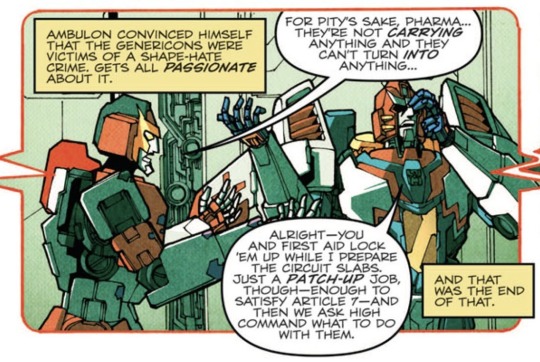
Also, First Aid later confirms that communications were fine until the Big Bang (soundbomb detonation):
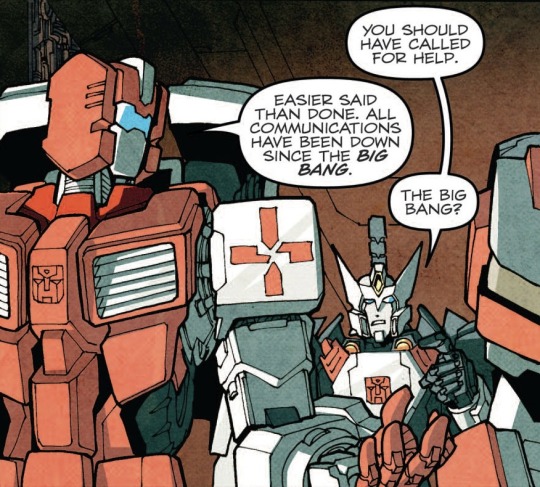
It’s always possible the DJD was monitoring the radio waves, but secure subspace frequencies exist, such as the Datalog Network First Aid used to send the datalog containing the death statistics:

Speaking of which, assuming First Aid sent the datalog with the statistics right when things started to get ‘weird,’ and before the Big Bang shut down comms, it only took—at most—a few days for them to reach Ratchet and Swerve on the Lost Light:

But back to Pharma not calling for help: for all of Prowl’s intel, contingency planning, and fretting over the security of Autobot territories, I find it hard to believe he would have stuck an Autobot medical team on the fringes of DJD territory without giving them some means of securely contacting the outside in case of issues.
But even if Prowl didn’t give Pharma a secure way to contact him or anyone else, and even if Pharma was convinced the DJD was monitoring regular communications, there were other ways he could have reached out for help. After all, the team wasn’t alone on Messatine. Like Pharma said, Prowl continued to send bots to defend the nucleon mines:
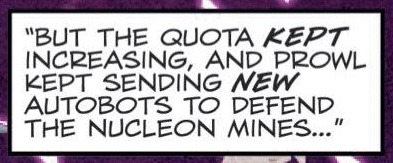
The Autobots had been mining nucleon for millions of years at this point, so I doubt the mined nucleon was just sitting in storage on Messatine; shipments of the stuff would have been sent off-world to wherever the Autobots needed it. Why not send a message for Prowl with someone leaving with one of those shipments? A message meant only to be sent over a call when absolutely certain they were out of range of the DJD’s potential monitoring.
Or, why not order in off-world medical supplies and send a message back with the delivery bot(s)?
There are two possible answers to this. One takes into account JRO’s word on the subject; the other is more intricate and speculative on my part, but it leads to the same place. So whatever your stance is on the validity of word of god, there’s an answer for you.
Answer one (word of god)
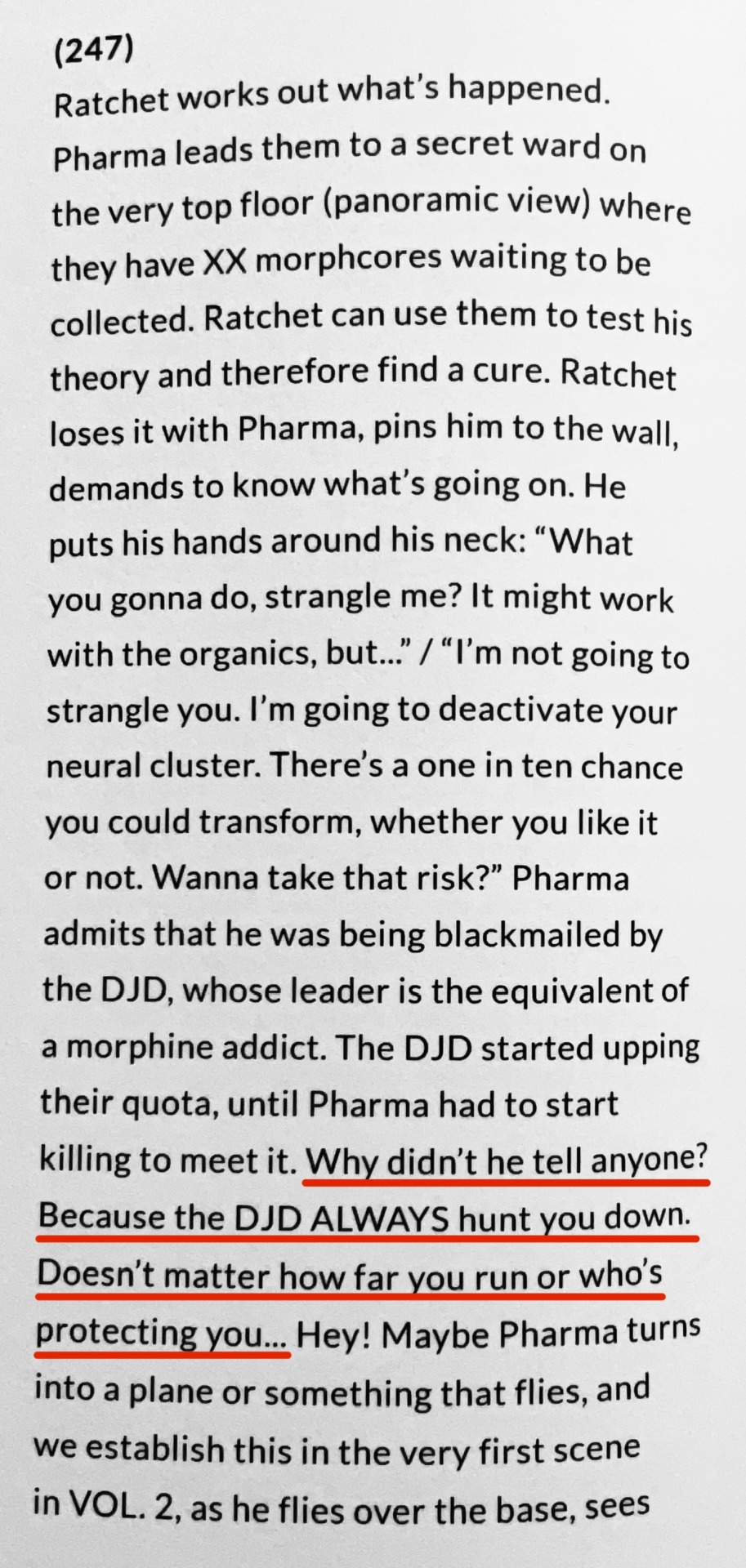
Simple as that. Pharma was aware of the scope of the DJD’s capabilities and relentlessness, and determined he was trapped prey.
Answer two (no word of god)
There are a few possible reasons Pharma didn’t call for help right away:
He was convinced all his other options would take too long and/or would still lead to him being put under suspicion. After all, being found to have harvested even a single T-cog from an already-dead patient for the DJD could have raised concerns that would lead to Pharma being investigated and/or having a mark put on his record.
He underestimated the severity of Tarn’s addiction, and was certain he could keep up with the T-cog demand without resorting to other means of harvesting, not realizing Tarn’s quota would increase later on.
He was already paranoid as a result of whatever mind games Tarn had set in motion at their first meeting, making Pharma think escape was futile.
Word of god or no word of god, there are clear reasons as to why Pharma ended up trapped. Most likely, it was a mix of all of the above.
Whatever was going on in Pharma’s mind before, he ended up in deeper trouble. Tarn increased his demand for T-cogs, and Pharma couldn’t keep up. By the time this happened, even if he had wanted to call for help, it was too late to do so without implicating himself. He reasoned his only option was to start killing patients to harvest their T-cogs.
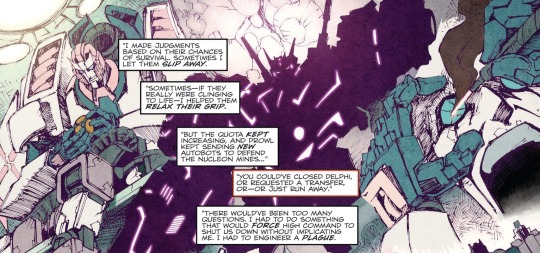
Soon, Pharma was so consumed with fretting over whether he’d be able to meet Tarn’s next demand that he didn’t have time or freedom to do anything else except worry and feel guilty. His whole life revolved around Tarn’s addiction; he was no longer in control, and could no longer enjoy whatever it was about Delphi he’d previously enjoyed. Perhaps the facility itself enabled Pharma to research cures and perform scientific miracles of medicine.
Being at the mercy of Tarn—convinced the DJD would find him no matter what—would have been pure psychological torture on its own, but also knowing that any small chance he did have of getting help would end in him losing everything would have added to his suffering. Pharma became desperate to reclaim control over his life and began planning an escape.
Now, JRO has said that Pharma didn’t originally plan to use the rust plague on the DJD…but canon says otherwise:

Of course, Pharma could have been lying to make himself look better in Ratchet’s view, but based on everything he’d been through up to this point with Tarn, it’s more likely he was telling the truth and had tried to eliminate the source of his suffering first. After all, wiping out the DJD would have been the simpler, cleaner option.
When the Duobots refused to detonate the soundbomb near the DJD, Pharma’s objectives shifted. He had to get Delphi shut down in a way that would:
Convince the DJD the shutdown was legitimate.
Pharma knew chances of escaping the DJD at all were slim to none, but he was desperate. Getting Delphi shut down would cut off Tarn’s supply of T-cogs and allow Pharma to escape Tarn’s immediate control, but the shutdown had to be “legitimate” to prevent Tarn from retaliating and hunting him down later. Leaving Tarn even the slightest chance of regaining control was too risky, so Pharma had to make sure his plan was as airtight as possible.
Cover up the patient murders.
If the truth got out about Pharma killing patients, he’d lose his medical license and most likely be put away for life. Being cut off from the practice of medicine and his intellectually stimulating work as a doctor would mean losing more than a job and a reputation. It would mean losing everything in which he’d anchored his sense of identity and life’s meaning. His refusal to consider any other options wasn’t just about ego and preserving his image as an excellent doctor; it was about preserving any kind of meaningful future he saw for himself.
Pharma needed a plan that would fulfill all of the above. Turning the engineered virus on the medical facility was the most effective and efficient solution. Anything else would have made him suspicious in the view of either Autobot High Command or the DJD, and neither of those would have ended well for him.
Because of his goal to preserve his reputation and future in medicine, he couldn’t even risk revealing anything to First Aid or Ambulon, who would have seen to his ruin. They became nothing more than loose ends that had to be tied up, and based on the fact that Pharma only prepared one vial of the vaccine, his original plan involved him being the only survivor:
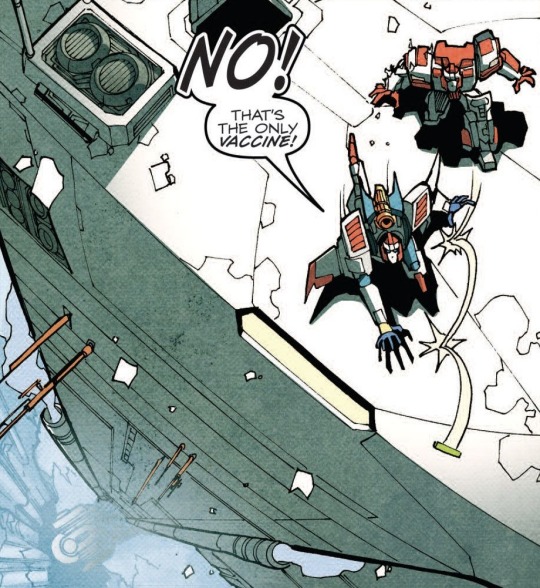
He probably would have had no problem making more of the vaccine for anyone else who survived, but he wasn’t counting on it. He wanted a totally clean slate; in letting his staff die with most of his patients, he would be getting rid of any and all evidence and reminders of his failures. He may have cared about First Aid and Ambulon before things got bad, but somewhere along the way, he decided either it wasn’t worth it to go through the trouble of finding a way to save them without raising suspicion, or he didn’t want to risk them putting together the pieces later on.
Of course, when Ratchet showed up, plans changed.
Ratchet
Ratchet is not the kind of person who seeks first to understand or be understanding. He’s inclined to trust what’s in front of him over anything abstract, and tends to look at the results of someone’s actions over trying to find any kind of ‘why’ behind them. Also, unlike Pharma, he operates from a strong moral sense, and reacts quickly and strongly when something or someone goes against that internal moral sense.
Ratchet’s reaction to finding out what Pharma did may seem hasty and harsh, but it makes perfect sense on a human level. There is no such thing as unconditional love; everyone has personal and moral lines (boundaries), and they’re different for each individual. When the most rigid of lines is crossed, that’s it; walls go up and the offender is cut off, no matter how strong the relationship may have been.
Ratchet obviously knew Pharma well enough to think he could try talking some sense into him, but then Pharma revealed that he’d crossed one of Ratchet’s lines: murdering patients. Any willingness Ratchet may have had to try to understand vanished. By the time Pharma started trying to provide a ‘why’ for his actions, Ratchet’s moral judgment had already shut down any chance of understanding what could have possibly led Pharma to kill patients. It didn’t help that Pharma seemed totally unapologetic and outright proud of his plan. For Ratchet, the ‘why’ didn’t matter anymore. What he saw was what he trusted, and what he saw was a friend who’d become his idea of a monster.
Now, Ratchet and Pharma’s relationship is one of the most confusing IDW relationships I’ve had the pleasure and pain of dissecting.
It is notoriously difficult to determine the depth and strength of a relationship from the outside. However, I’ve decided to go ahead and address it anyway because it has the potential to provide insight into Pharma as an individual.
If I were to sum up Pharma and Ratchet’s relationship in a single word, I would use “ambivalent.” The first time I read MTMTE, the thing that stood out to me most about their relationship was the drastic differences between how they each perceived the relationship.
In one sense, there’s the idea of Pharma basically being Ratchet’s crazy stalker ex, which is tossed around in fandom a lot. While I personally dislike seeing it regardless of context (yes, even as a joke), I do see how JRO’s writing choices set things up in a way that makes it easy to superimpose that trope.
In another sense, there’s the idea that Pharma and Ratchet were always close friends, and that what happened at the end of the Delphi story was a betrayal of both sides that came out of nowhere and whose consequences were taken too far.
I disagree with both. Personally, what I see at the end of the Delphi story isn’t an obsessed ex gone mad, a sudden betrayal, or a badly executed backstabbing. What I see is a breakdown of an already-complicated and poorly-maintained relationship: true feelings being revealed, long-repressed bitterness being forced to the surface, carefully-hidden cracks being split wide open.
Most people don’t have an accurate understanding of how much or how little they truly know the people in their lives, often overestimating how well they know a person until something surfaces and blindsides them.
According to JRO, Ratchet was oblivious to Pharma’s romantic interest, and throughout canon, it’s easy to see Pharma was more invested in the relationship than Ratchet ever was.
The question is, did Ratchet ever care about Pharma at all? And if so, to what degree?
Yes, Ratchet calls Pharma “buddy” and “friend,” but the former was sarcastic, and the latter means something different to each person. Also, in light of the circumstances, Ratchet could have just been saying “friend” in response to Pharma saying it—an emotional appeal more than anything.
However, Pharma must have been aware of Ratchet’s lack of relational investment because during the confrontation at Delphi, Pharma’s first reaction wasn’t to appeal to their friendship (ex: “But you know me!”). Instead, he appealed to their shared profession:
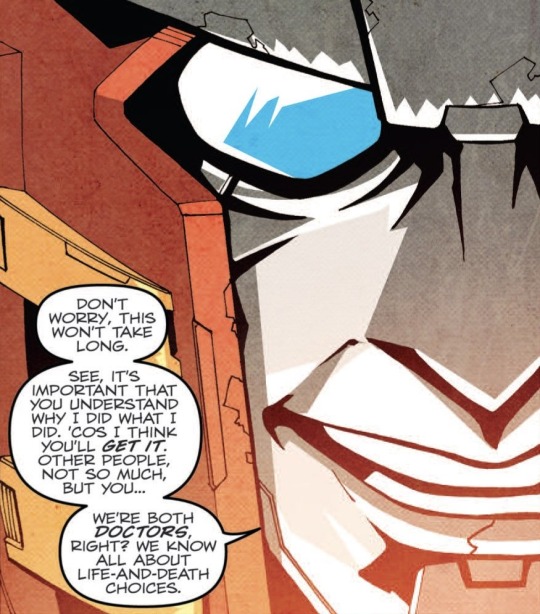
Then there’s the exchange of insults:
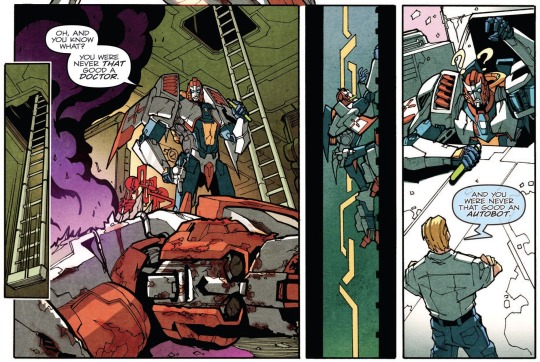
This is what I meant earlier by “true feelings being revealed.” Ratchet may have just been trying to match Pharma’s insult, but it’s unlikely it was merely reciprocal because while Ratchet is snarky at times, he’s sincere in that snark. There’s almost always some truth in his verbal jabs no matter how unserious they seem, and he’s never cruel for cruelty’s sake.
So, if Pharma saw Ratchet as an inferior doctor, and Ratchet saw Pharma as an inferior Autobot…it’s reasonable to assume there was always some deep-rooted competition and conflict preventing them from being super close.
Possible suspicion surrounding Pharma’s conduct as an Autobot paired with a tendency to misjudge the nuances of relationships could explain why Ratchet was so quick to decide Pharma was a lost cause. Maybe Pharma’s actions at Delphi confirmed something from the past that Ratchet had brushed off for whatever reason.
In any case, Ratchet seems to have been largely unaffected by the Pharma he found at Delphi. While leaving Messatine, he emphasizes that he’ll miss Pharma’s talent.

Not “who he used to be.”
Not “what we used to have.”
Just…“his talent.”
Later, on Luna 1, Pharma mentions that he and Ratchet were inseparable, but that could mean a few different things:
Best case scenario: Pharma and Ratchet sought each other out on equal terms.
Worst case scenario: Pharma followed Ratchet around.
Somewhere in the middle: the job forced Pharma and Ratchet to work in close proximity most of the time, and while Pharma intentionally ran into Ratchet more often than necessary, Ratchet also sought out Pharma every now and then.
Whatever the case, working with someone every day doesn’t tell you anything about who they are as a person, and the amount of time spent with someone doesn’t automatically correlate to how deep the relationship is or how well the people know each other. It’s not like either Pharma or Ratchet are shown to be good at expressing their personal feelings outside of extreme circumstances.
Ratchet does bring up late-night conversations of the past:

But while this indicates there was something deeper between him and Pharma, because neither of them were ever shown to be super open with their true feelings, it’s unlikely the conversations were full of touchy-feely talk. In all likelihood, the conversations were mostly medicine and war-related, with the rare spark-to-spark talk sprinkled in. Also, considering everything up to this point, one has to wonder if those talks ever meant anything to Ratchet, or if he was just digging for something that might stall Pharma’s torture.
Maybe those late-night conversations did mean something to Ratchet, but whatever the case, Pharma didn’t take the bait. He knew Ratchet was trying to stall by making an emotional appeal, and perhaps he was convinced the conversations hadn’t meant that much to Ratchet.
Looking at all of this, it’s hard to believe Ratchet ever cared about Pharma as more than an interesting work friend. But even if he had cared more than he let on, it wasn’t enough to overcome the doubts he had about Pharma’s character.
As for whether Pharma truly cared about Ratchet, I’m convinced he did, but in a mostly unhealthy way, and with a strong undercurrent of one-sided rivalry. At some point, Ratchet had been an equal and a source of challenge, and he probably listened to Pharma pretty often. It’s reasonable to assume Ratchet was one of the only people—if not the only person—able to handle Pharma’s intense temperament and challenge him in a meaningful way, providing some semblance of friendship for Pharma.
However, one last thing that stands out is that, when telling Ratchet why he’s torturing him, Pharma didn’t say anything like, “Because you hurt me” or “Because you turned against me—your friend.” Instead, he said it was for “ruining things at Delphi” and because “you declared war on my body.”
Either Pharma wasn’t being entirely honest, or Ratchet’s friendship didn’t mean as much in the first place as he’d previously implied. It’s possible the ‘Because you hurt me’ was implied in “for ruining things back at Delphi,” but why not say it outright? Perhaps it was a fear of vulnerability and admitting there was ever a relational need at all.
At the end of the day, it’s difficult to say for certain how close Pharma and Ratchet were, but it’s clear they were never on the same page and there were always barriers between them.
Luna 1
Revisiting the matter of Pharma’s morality taking a backseat to other priorities, his time on Luna 1 further underscores this. Again, Pharma chooses his battles and is unwilling to put himself at great risk for the sake of others, but a closer look at the situation with Tyrest reveals there wasn’t really anything he could have done for the Cold Construct population even if he had wanted to. It would have been him against Tyrest, an army of Legislators, and a bunch of Decepticons. Pharma knew his limits, and seeing as his goal was self-preservation, it was perfectly rational for him to go along with Tyrest’s grand scheme.
Besides, it doesn’t look like he was given much of a choice:

Although, knowing Pharma, he still would have demanded to know beforehand what he would get in return for the pain, and evidently, Tyrest held up his end of the deal since Pharma had access to the Luna 1 tech collection.
As for Tyrest’s plan to wipe out the Cold Construct population, there’s nothing indicating Pharma’s decision to turn a blind eye to it was rooted in malevolence or bigotry—just rational apathy: ‘I can’t stop Tyrest, so why concern myself with the outcome?’
Again, you can’t save everyone; Pharma had all he could do to save himself.
But it wasn’t all horrible. I would even go so far as to say Pharma found some happiness on Luna 1. Tyrest didn’t care about him, but he didn’t need Tyrest to care. Everyone else there hated him, but he didn’t need to feel like he belonged or was admired. At this point, Pharma’s only interest was Tyrest’s Luna 1 tech collection, and that meant playing nice so he could keep his reward. Back at Delphi, he probably assumed he’d never again practice medicine the way he’d loved; being brought to Luna 1 was an unexpected, yet welcome, second chance.
Even so, Pharma had his moments of cruelty. Back at Delphi, he had easily-identifiable reasons to kill patients—both the ones whose T-cogs he harvested and the 20 more he tried to kill when he shot the life support machine. But on Luna 1, he had no reason to be cruel, yet he chose to be. By this point, he’d mastered the ability to almost completely ignore or subdue his conscience.
In the case of Ratchet’s torment, one could argue Pharma only drew it out for retaliation purposes; it was personal for him.

As for cutting Ambulon in half, it was obviously meant to be as gruesome as possible, yet also quick. But personally, I don’t think it was about Ambulon; it was more about hurting Ratchet. Due to the fact that Ratchet’s identity is wrapped up in his compassion and his ability to be helpful as a doctor, one of the most effective acts of revenge would be to do something that makes him feel utterly helpless.
Also I wonder if, subconsciously or consciously, Pharma was attempting to recreate the sense of helplessness he felt back at Delphi under Tarn’s watch: “Do you see, Ratchet? Do you now understand how it feels to have control ripped out of your hands? To be totally helpless?”
Next, for some reason, Pharma was invested in the promised execution of Getaway and Skids:

He had no personal connection to either of them that would give him a reason to be interested, so maybe Tyrest told him he could perform the execution and/or have the corpses for medical experimentation. Either way, Pharma would have had a chance to use some of the tech in Tyrest’s tech collection, possibly explaining his excitement.
Of course, any chance of an execution disappeared when the final showdown went wrong.
When Pharma tried to escape to Cyberutopia and discovered he couldn’t pass through the spacebridge forcefield, he gave up. He’d been caught; he would no longer have access to Tyrest’s tech collection; Ratchet and every other self-righteous Autobot would never forgive him; and the morality lock prevented him from escaping. By all appearances, he would never again be able to engage in that which gave him a sense of meaning. He had shrunken his world down to his obsessive interest in a specialized field and one significant, yet unrequited relationship. With both of these lost, his world collapsed.
Yes, guilt played a part in Pharma’s despondency, but because he seems to have been in denial of said guilt, it’s more likely his despair was primarily due to the fact that he saw no future for himself. He had nothing left to live for.
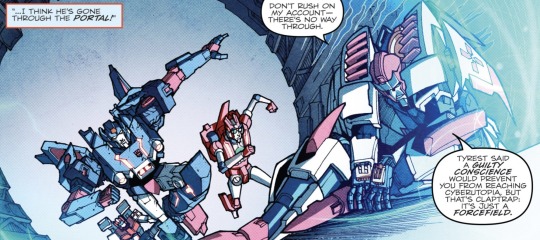
In light of this, Pharma’s flippant comments to First Aid make sense. He wasn’t being insensitive as much as he was goading First Aid. Pharma’s not stupid. First Aid had a massive rotary cannon on him, and Pharma knew exactly which emotional buttons to push to get him to pull the trigger.
Pharma wanted to die.
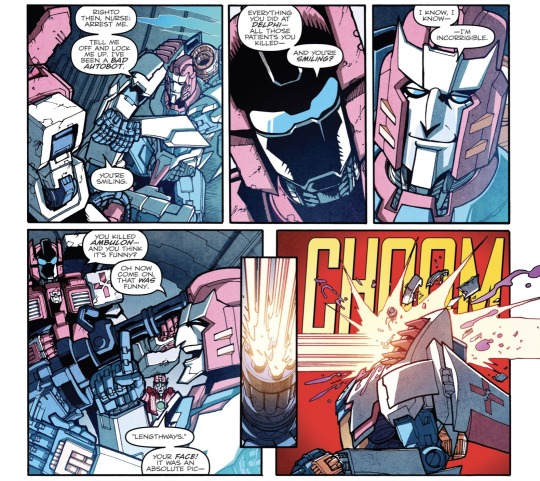
Adaptus
First, let me emphasize that Adaptus did not take possession of Pharma’s body. Instead, Pharma was the unwelcome guest:
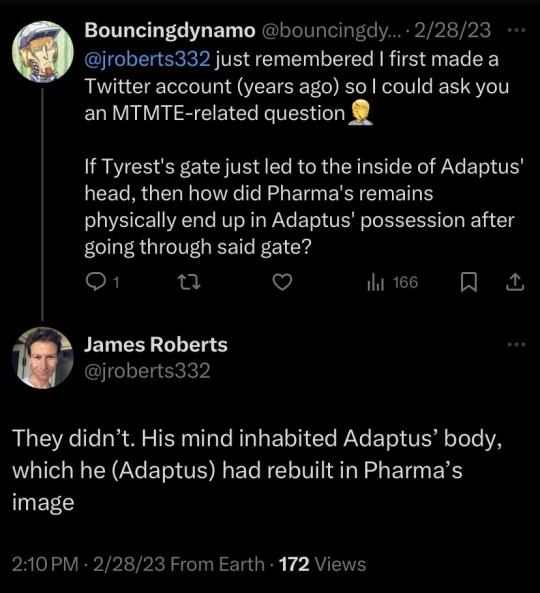
How Pharma ended up in Adaptus’ new body is a mystery, but whatever the case, Pharma didn’t pass on to the Allspark. Whether or not he had a choice can only be speculated.
First Aid had blasted Pharma’s head clean off, so whatever happened must have been related to the spark. Perhaps some residual spark energy was trapped in a body part that Adaptus repurposed, leaving Pharma tethered to the new body unwillingly.
Still, Pharma managed to assert his will and override Adaptus for a brief moment. Considering Adaptus was basically a god, this is impressive.
Based on Adaptus’ surprise at being interrupted, it seems he didn’t know Pharma was there. Why Pharma hadn’t tried to assert himself sooner is a mystery. Maybe Adaptus’ scheme was entertaining; maybe Pharma actually liked the company; or maybe he’d been waiting for an opportunity to get revenge on Tyrest for everything done to him back at Luna 1.
Sure enough, just like with Ratchet back on Luna 1, Pharma’s vengeful streak came out as soon as there was an opportunity.
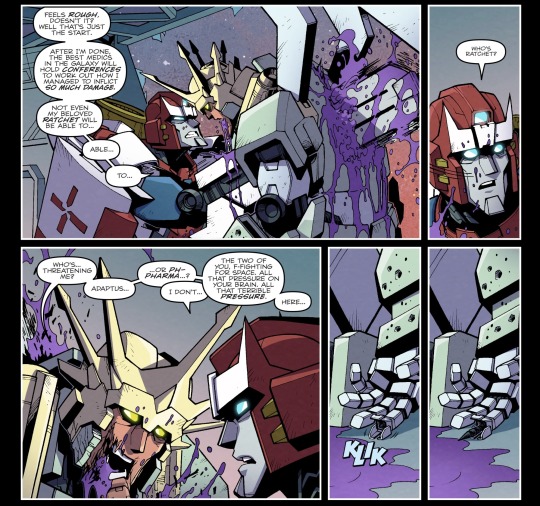
Unfortunately for him, this left him vulnerable, and Tyrest took advantage of the confusion:
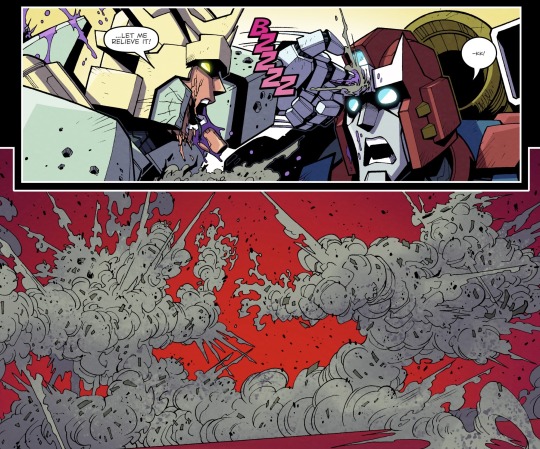
Conclusion
When someone reduces their world to narrow personal interests and one or a few very special people, their grip tightens around what little they have. They often become obsessive and possessive of the few things that make them feel alive, and their view of the world becomes increasingly more subjective and detached from the outside world. Pharma seems to have fallen into this trap.
Even so, in the context of the circumstances, several of the decisions he made were rational—even if coldly so. Oftentimes, “extreme” rationality and self-preservation are villainized in fiction, and characters like Pharma who don’t automatically put themselves at great risk for anyone and everyone are villainized, or at least looked down on. Their choices are often regarded as less human, but rationality and self-preservation are just as human as compassion and self-sacrifice.
Ultimately, Pharma was trapped and pushed over the edge into “insanity” by Tarn’s cruelty, but his own choices made from a place of pride determined how he fell, and how far he fell. It was a perfect storm of Tarn’s mind games and Pharma’s intellectual arrogance, excessive self-confidence, obsessive nature, and stubborn grip on the kind of future he wanted for himself.
Pharma is yet another Icarus who flew too close to the sun and paid dearly for it, and while JRO/the narrative could have given this Icarus better wings, that doesn’t change the fact that he chose to fly so high.
***
Many thanks to anyone who made it to the end of this monster of a post.
-tosses a Rodimus Star at you-
#look who finally finished this thing#idw transformers#idw1#maccadam#MTMTE#lost light#idw pharma#pharma#tf idw character analysis#tf idw meta#dr. fancy hands#nova’s nerding out again
323 notes
·
View notes
Text
made a tfp au tailgate that’s based more on his mtmte version!!
(backstory under the cut)
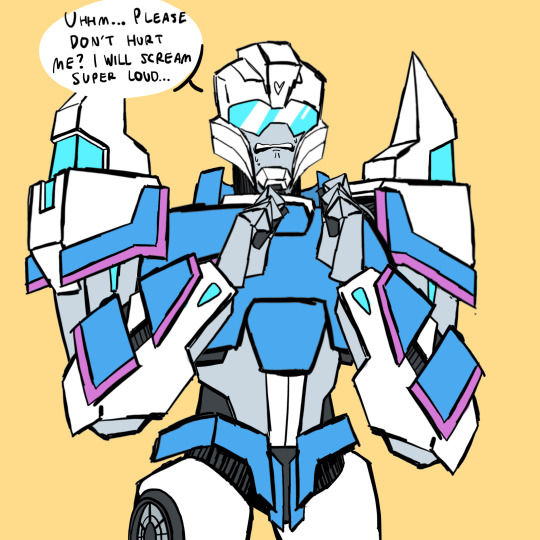
Born with a condition that makes it so that he can’t scan or transform, Tailgate had to endure years of discrimination from peers for his disability, often feeling isolated or ashamed of himself. The treatment persists to this day on Earth with Team Prime. They shelter him due to a multitude of reasons such as protection and fear of being discovered. More than anything, Tailgate wishes to be treated like everyone else.
So it was only natural that Tailgate would seize opportunities to sneak off base to escape the crushing atmosphere of Outpost Omega One. It was during one of these excursions that he ran into the Decepticon Cyclonus.
Rather than deactivating him, Cyclonus was more flabbergasted on why Tailgate doesn’t even know basic self-defense. So, he proposes an idea: he’ll train him so that he can actually pose a challenge when they meet on the battlefield (his actual reason is so that when the time comes, he would be able to deactivate him without regret). And out of pure desperation, Tailgate accepted, thus starting an odd… acquaintanceship.
Bits of info:
- NOT RELATED IN ANY WAY TO THE TAILGATE ALREADY IN TFP
- Actually physically strong but doesn’t know how to use his strength
- Panics a lot
- His condition isn’t fatal
- Can’t be cured
- It’s not as simple as replacing the T-Cog as its also linked to a bot’s coding and their spark
- Not cybercrosis
399 notes
·
View notes
Text
Rodimus, just finished doing something stupid: -so that's how I ended up in the medbay missing half my armor. How about you?
Thunderclash (saw Roddy's boobs and got so hard he got nauseous): i think i hauve cybercrosis
131 notes
·
View notes
Note
God, I seriously need Bumble Prime's angst with his old team, the poor guy has had the worst character development in the world, they literally killed his son and his teammates will probably come back as if nothing had happened and he's like, "Where's your honor, you scumbags! "
On top of that it seems like he is dying due to problems with his spark, his life is full of misfortune
It's not just only that
He's also suffering back pains and Cybercrosis!
Oh geez maybe I am insane...
#transformers animated#tfa#tfa bumblebee#bumble prime#working on a transformers au#deepfried answers
24 notes
·
View notes
Photo

Atrophosia: Degenerative disease, similar to Cybercrosis.
Infection is linked to contact with organic lifeforms.
Hmm...
Humans are organic lifeforms.
I wonder if Ratchet’s own health condition may not solely be the result of age or chronic stress from war-- Might be the case that his exposure to humans may have impacted his symptoms/symptom severity/disease progression/etc. in some way.
The other bots who have been to Earth never really dealt with humans up close as much as Ratchet and Bumblebee did, although Jazz etc. were shown to engage with the local human populations as well.
But Ratchet spent a notable amount of time with humans from pretty early on in IDW 1′s run, mostly Hunter and Verity, who were frequent passengers of his for a while.
We already know that Cybertronians, for a long time, seemed to believe themselves essentially immortal (barring certain injuries) owing to their long lifespans compared to other species and their overall hardiness-- There doesn’t seem to be much information in universe regarding other potentially life ending conditions, which may be the result of this apparently long standing belief.
But the few more serious conditions we see in IDW1 tend to be degenerative ones.
Atrophosia. Cybercrosis. Eventual (or age related) spark burn-out. They all happen gradually with a decrease in ability over time, although onset of symptoms, what symptoms are, etc. seems to vary, and we know from Tailgate’s case that Cybercrosis can potentially cause death fairly quickly.
But a condition like Ratchet’s, and seemingly Atrophosia as well, may both cause decompensation over a longer time period.
At the same time, Ratchet notes that Atrophosia specifically is caused by some kind of infection, caused by contact with organic lifeforms.
There are a lot of questions; How does that infection occur? Does he literally mean infection via physical contact with an organic lifeform? What exactly is infecting people, what does this infection consist of? And so on.
We don’t really have answers in canon.
But it’s interesting to think that perhaps exposure to organics might be more of a health risk for Cybertronians than is typically recognised in-universe. What those risks might be is unknown, if contact increases certain risks at all, etc.
We know that Ratchet’s condition is age-related spark burn-out, which Pharma nearly diagnosed by accident when he disassembled Ratchet and was messing with his spark casing.
But could exposure to organic life on Earth have impacted Ratchet’s health outcomes or symptomatic expression, even if he may have already been in the early stages of developing spark burn-out by that time?
Just thinking out loud; I came across this panel again recently, and it stuck out to me.
270 notes
·
View notes
Text
Hey I feel like being annoying about Pharma again
Remember how cybercrosis was a terminal illness that slowly degraded your senses and paralyzed your whole body and painfully killed you over a matter of days
Remember how Pharma had notes on Luna-1 with his research on a cure for cybercrosis and translating it and completing it was how the other medics developed a cure (too late to save Tailgate, but enough to save anyone in the early stages)
So yeah Pharma literally laid the foundations to curing one of the most deadly/painful Cybertronian diseases. While he was in his "mad doctor" phase, he literally used his time to continue doing medical research in continuation of his already stellar career as a doctor. "The pillar of society of medicine being corrupt" who?
#i wonder if ratchet and co stole credit for the cure the same way ratchet stole pharma's hands as hos#another thing to put in an eventual adaptus-pharma era fic lol#squiggposting#pharma apologism
14 notes
·
View notes
Text
Just finished MTMTE issue #48 in my reread and this feeling has been building up in me from pretty much the beginning... I think Tailgate and Swerve would've been a way better and more obvious couple than Cyclonus and Tailgate.
I mean, Tailgate's happiest memory was movie night, specifically when Swerve was inelegantly stuffing his face?! It was even drawn like Tailgate was gazing fondly at Swerve—this feels like the very definition of love!
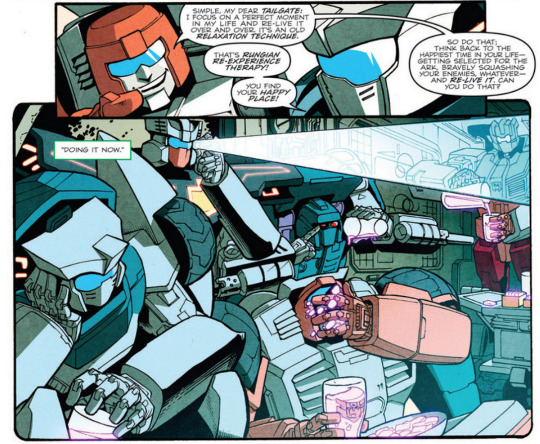
And when Tailgate was dying, he renounced his dreams of being a hero and instead longed for Swerve's and movie night! And speaking of Tailgate's illness, Swerve cured cybercrosis for Tailgate—it felt so contrived that it just had to be too late so Cyclonus could save Tailgate with a magic phallic sword instead. None of this is even getting into Swerve's desperate desire to be someone's number one for once... and how in his moment of crisis, Tailgate made a reference to the same moment pictured above in this post. I also felt bad for Swerve when he asked to room with Tailgate and got turned down for Cyclonus, who is someone who killed Swerve's comrades in the past.
A lot of the growing feelings in Cygate feel abrupt or like they've grown out of contrived situations that have forced the characters together, to the point that I don't really see how their desires and personalities and interpersonal history are supposed to be conducive to a relationship, whereas the friendship between Tailgate and Swerve has felt natural this whole time and their chemistry is great.
35 notes
·
View notes
Text
An Unfamiliar Battlefield
Anonymously requested here on Tumblr
Continuity: IDW1 (roughly)
Relationship: Megatron/Hot Rod
Characters: Megatron & Hot Rod
Rating: Teen
Warnings/Notes: AU of an AU, Canon Blending, Past Relationships, Referenced Character Death, Romance, Recovery from Grief, Vignette
Crossposting: AO3 | Dreamwidth
Summary: In which a seemingly unqualified suitor vies for the open Lord Protector position for the Prime of Destruction.
Fic below cut.
Small. Thin armor. Loud paint. Incautious gait.
Megatron could have crumpled him like a frail sheet of foil if he so chose.
Yet in front of him, posed confidently with his hands on his hips at the foot of the impractically tall dark granite dais, beamed some red little fool the herald had introduced as “Hot Rod of Nyon.” Given the obnoxious flames painted on his chest, Megatron thought the mech’s name was a little on the nose.
This scrawny fool, apparently, wanted to be the Lord Protector of the alleged incarnation of Destruction itself. What a ridiculous thought.
Since Orion, Megatron’s previous Lord Protector, had succumbed to early onset cybercrosis more than three decades ago, Megatron had spent most of his time alone.
He, in fact, intended to keep it that way.
Watching his partner waste away against an invisible foe had been more of a punishment than being forcibly ascended to a position of ritualized shame and fear for his crimes had ever been.
The ritual mourning periods of seven months, then thirty months, and then a decade had all passed. The generals and officers who made up his “priesthood”—more like a religious militia meant to keep him in check—hadn’t pressed him to take another protector before the formalized markers of grieving had been reached. It wouldn’t have been proper, for all they, his prison wardens, pretended to care about propriety even when their “Prime” still lit decennial memorial lamps.
Megatron, regardless of his own opinions on the matter, was kept around solely for the fulfillment of ancient laws and summoning his strength in times of war. The First Prime was nominally the Prime of War, but Sentinel spent far too much time playing politician, leaving Megatron as the de facto holder of the purview.
It wasn’t as though he needed protection, not physically. He could protect himself, as was obvious from the battlefields they pleaded that he would drench in spilled fuel, like the arena of banal bloodsport they had unilaterally plucked him from. When Megatron had turned the rare suitor away before, the battle clerics hadn’t objected too strongly.
Usually.
Besides, it wasn’t as though suitors were commonplace. Not many were lining up to consort with a “deity” of death, forced to use his violence as a tool for theocratic control. Orion, before his untimely death, had been an irreplaceable exception. No one is else would or could ever take that place again; it would never be the same.
Starscream, the general who oversaw all the others who allegedly paid Megatron homage, was a sharp-eyed mech with innumerable half-spoken agendas. He relished being what passed for this "Prime's" high priest, chief jailer rather. This was clearly part of some of his machinations.
He stood, smirking, next to Megatron’s throne, arms crossed in front of his chest. His gleaming white wings were held out wide as he swayed side to side, not-so-subtly trying to make his heavily embroidered cape undulate in the artificial breeze.
“Starscream, this is unnecessary,” Megatron said, hunched over with his elbows against his knees. He glowered down at Hot Rod. “You know this is unnecessary.”
Hot Rod was hardly much bigger than one of Soundwave’s mini-bots, who were generally relegated to sabotage work as a result. A Lord Protector, expected to accompany him into the heat of battle, could never be allowed to fill a less combat-oriented position. Hot Rod would end up as little more than shrapnel littering the battlefield.
“Come now,” Starscream said, his slick grin stretched broad. It barely concealed that he was up to something, a fig leaf of pious duty. “It’s been so long since you’ve kept any company but your own.”
They both knew the other role a Lord Protector fulfilled: controlling the sacred monster.
“He’s not—“
"You've been lonely, absorbed in nothing but your work for far too long."
Starscream, of course, would be eager to have someone once more take up that mantle… for the approval of the public rather than practical necessity, given Megatron’s self discipline. That was likely why he had allowed this fragile mech to even put forward a petition. Any tether at all was better for their reputation than a beast with no leash.
“I’m right here!” Hot Rod, speaking for the first time, brazenly put his foot on the lowest step on the dark dais and smacked his tiny fist against his chest. His beaming grin became a frown at the perceived disrespect. “Don’t talk about me like I’m not here.”
What a rude little mech.
Talking out of turn, ascending the dais uninvited…. No self preservation to be had. The distance was supposed to be for the protection of any visitors, in case the “god” lost control. More time for the jailers masquerading as devotees to restrain him if the Lord Protector didn’t get there first.
This Hot Rod was clearly on some elaborate suicide mission for some reason. This was far more effort than most would bother putting towards such an end; there were doubtlessly easier ways to go about it.
“Just how badly do you want to die?”
“Not at all, actually.” Hot Rod didn’t back down, a determined look set on his face. “A big shocker, I know.”
Not the answer Megatron had expected, not that mechs tended to be forthright about their deathwishes.
“What exactly is your purpose here?”
“Surely, that’s self-evident.” Starscream’s opinions, as usual, were unnecessary so Megatron ignored him.
He merely repeated the question to Hot Rod, who had begun climbing the dais as though he thought he’d been given some sort of invitation. His bright paint was a stark contrast to the stone, black as the void, giving the impression of a rising star.
Some of the officers, all armed with guns and blades, stationed at various points up the steps began to shift, bristling with unease at the blatant disregard of norms. Several stepped forward, as though to get in the intruder’s way.
Megatron gestured for them to take no action.
“Yeah, I’m pretty sure it’s obvious what I’m here for.” Brow furrowed, Hot Rod continued scaling the dais, stepping past the officers as though they were harmless bystanders. Armor clattered in the quiet hall as they made way for him.
Hot Rod’s bravery reminded him somewhat of Orion.
Orion had not climbed to meet him, no, but had lain down his weapons on the floor of the hall and had challenged Megatron unarmed combat.
Hot Rod too was challenging him in a way, but why?
Megatron silently let him approach.
Starscream whispered a reminder to mind his manners, as though he were some uncouth newbuild courting for the first time.
If only Starscream didn’t have wings…. Megatron occasionally considered pushing him off the side of the platform.
Once Hot Rod reached the top level, he stopped just within arm’s reach of the throne.
Megatron leaned forward, as far as he could without overbalancing. Seated, he was at Hot Rod’s eye level.
“What do you gain by asking this?”
Hot Rod’s bright smile was back, this time as a smirk, like he thought Megatron was joking.
“What do you lose by letting me?”
Smart aleck.
“Why are you determined to die?”
“I’m not.” Hot Rod shrugged, as though that were the obvious answer despite all evidence to the contrary.
“So you’ve said before, yes, but that’s the only outcome at the end of the path you’re trying to walk.”
“That’s my business, I think.”
Stubborn.
“So be it.”
Huffing, Megatron waved Starscream over without looking at him. The clicking of thruster heels against black granite told him that the high “priest” had obeyed.
“Yes?” he purred, clearly pleased with himself. He was getting what he had wanted after all.
“Have him trained. Presuming he survives, schedule the ceremony.”
32 notes
·
View notes
Text
Atrophosia
Masterlist
First case dated to the very beginning of the first cybertronian space travel, atrophosia has been know for eons as the organic disease, bringing up the first waves of hatred towards organics as a whole in the first eons of the cybertronian empire, where cyberformation was a must if any vessel were to encounter an organic planet.
Highly similar to cybercrosis in matter of symptoms, being constantly mistaken with it, treatment was hard to obtain, years later it was discovered that, different from cybercrosis, atrophosia was originated from constant contact with organics and even when the crew of the Lost Light found the cure for cybercrosis on Luna-1, atrophosia was yet to have a viable treatment.
A few years before the end of the war, the fear of atrophosia was high not only in the autobots' side, even decepticons, misplaced and forced to work with humans, had to endure many check ups just to clear their fear of contracting the disease.
"Most of us treated the humans as humans handle street rodents", former decepticon officer, Hook, describes, "but happy-go-lucky autobots touched humans like they were pets! More than once we found them cradling them as if protecting a turbo cat or something", he puts down his tools, working in blueprints, apparently for a green house, "Soundwave was always on edge for it, always bringing up contingency plans in case one of them contracted atrophosia, so only them suffered for it".
Atrophosia, like cybercrosis, has a 100% fatality rate, first symptom is the loss of innermost energon around the spark, which main work is to keep it almost intact, once the spark is vulnerable, the physical problems appear, such as the loss of the T-cog, followed by paralysis, loss of all receptors and basic senses, collapse of the frame and external armor with high exposure of the spark casing to other fluids that corrode the casing, once it reaches the spark, it will give up.
In recent years, atrophosia has yet to have a cure, but it has a treatment.
"If you get the solution before contact with organics, mainly humans, then the possibility to get atrophosia is almost non-existent", former autobot medical officer Kaltor explains before putting a needle inside a younger cybertronian's energon line, said mech smiles for the camera before grimacing for the needle, "these are nanites collected from a group of terraformers, even the new Prime! the scanned DNA of humans replicated with the CNA and got us this", the medic shows the camera the red like liquid, oddly similar to iron rich blood, "when First Aid sent us the first trial vials we thought he was saying nonsense but it worked, Ratchet was cured of atrophosia on the Lost Light with the first experimental sample, so we also gave it a try and look", next to him, many other mechs are seated, waiting for the liquid solution to complete the process while greeting the camera, "for the mechs already infected the fatality has plummeted to 2.3112% rate, still improving with every dosage, our clinic wing for organic diseases is full every cycle and we haven't had a loss since then".
Atrophosia is no longer a high danger for cybertronians, and relationships with organics, humans, elonians, visionaries and so on, keeps improving.
#transformers#tf mtmte#transformers idw#angst#terraformer au!#transformers worldbuilding#tf worldbuilding#tf hook
8 notes
·
View notes
Note
Idk if this has been asked but how did you come up w the gray years? I think it’s a interesting and sad story line and would love to read more about it
Thank you!
I came up with it because I realized that Ratchet was alive on TEG's Lost Light, and in the comics, Ratchet
SPOILERS
dies. Of... I think cybercrosis? A disease which TEG Ratchet would've also had. SO I knew that, at some point before SW boarded, someone would've had to have found a cure for that, to explain why Ratchet shows up in Ch 2 alive and well.
In terms of the 'gray years' themselves- this is based on 2 thoughts:
1. a theory/feeling that cybercrosis acts slowly, so-
2. Drift would've had years to watch Ratchet waste away, and they would've been horrible for him. The 'gray' in 'gray years' refers to that terrible pallor that life gets when you're depressed or ill. The gray years were Drift's years. Ratchet was sick, yes, but Drift was emotionally devastated. All color and life were gone for Drift as he watched his beloved waste away with no cure.
That's why they call that time period the 'gray years,' and that's why they take the anniversary very seriously. That's why, when Ambulon boarded and had a cure for Ratchet, Drift established all the gift-giving and ceremony to express his gratitude. Thank you, Ambulon, for returning color and love to my life.
27 notes
·
View notes
Text
thinking abt LL#24 again. specifically, ultra magnus and whirl.
thinking abt how of all the people who could have been paired up with ultra magnus to defend him, it was whirl. it could have been megatron. it could have been one of the scavengers who got split up trying to protect other crewmembers. it could have been chromedome and rewind.
but it wasn’t. it was whirl. chaotic, unpredictable whirl. whirl who started the war by beating up megatron, who has been arrested countless times by magnus and others, whose immediately previous conversation with magnus on mederi included no small amount of wariness on magnus’s end. that was the mech who was sent to guard magnus, who magnus allowed himself to be sent with.
and then magnus got hit with that rocket launcher. he was knocked out of his armour and rendered unconscious. he was the one who was supposed to open the matrix, because he was ‘decent’ and ‘one of the best’. but he couldn’t - he was unconscious. there wasn’t a backup plan.
it was whirl who opened the matrix. with his legs half blown off, with death on the doorstep and no chance of failure, it was whirl who crawled over to the matrix and made it open. whirl who spent the vast majority of the series embracing self-destruction, whirl who was alone and pushed people away, whirl who claimed his anger was an insulator and that he was broken beyond repair. it was whirl who opened it.
did they ever talk about that? did whirl let the rest of the crew believe it was magnus who opened it? did magnus let that lie persist? did he ever talk to whirl about it at all, the same way he once talked to cyclonus after he risked his life to save tailgate’s spark from cybercrosis, apologising or welcoming him aboard at the end of it all? did anyone else ever realise that whirl, for all the chaos that he had brought and continued to bring, was part of the reason their world remained intact, not because of his guns and defense of ultra magnus but because despite what he and everyone else believed, he was good enough in the end?
i think about it a lot.
#idw#whirl#ultra magnus#idw whirl#idw ultra magnus#lost light#lost light spoiler#boombox noises intensify#i may write a fic abt this bc. goddamn i have feelings#anyway i really love whirl
132 notes
·
View notes
Text
[ROUND TWO] Remain in Light vs Shadowplay


A quick summary/refresher for each storyline is under the cut including TFWiki links:
Remain in Light: the “series one” finale, where the crew winds up arrested by Magnus’ boss Tyrest following Magnus being near-lethally injured, and they find out he’s lost his shit and is about to kill most of the Cybertronian population remotely. Pharma’s back! Getaway shows up! Minimus is revealed! Rodimus gets crucified! And, finally, Tailgate’s Cybercrosis is resolved when Cyclonus lovingly stabs him. TFWiki.
Shadowplay: an arc giving pre-canon backstory for a bunch of the cast, except instead of direct flashbacks our protagonists are trading off on relating bits of a story they were personally around for, because they think this will probably fix Rung’s brain damage. Shockwave gets his backstory for IDW and there’s a heist. Drift and Ratchet bicker a lot. Optimus is here and jumps off plenty of buildings. Backstory is had, basically. TFWiki link.
18 notes
·
View notes